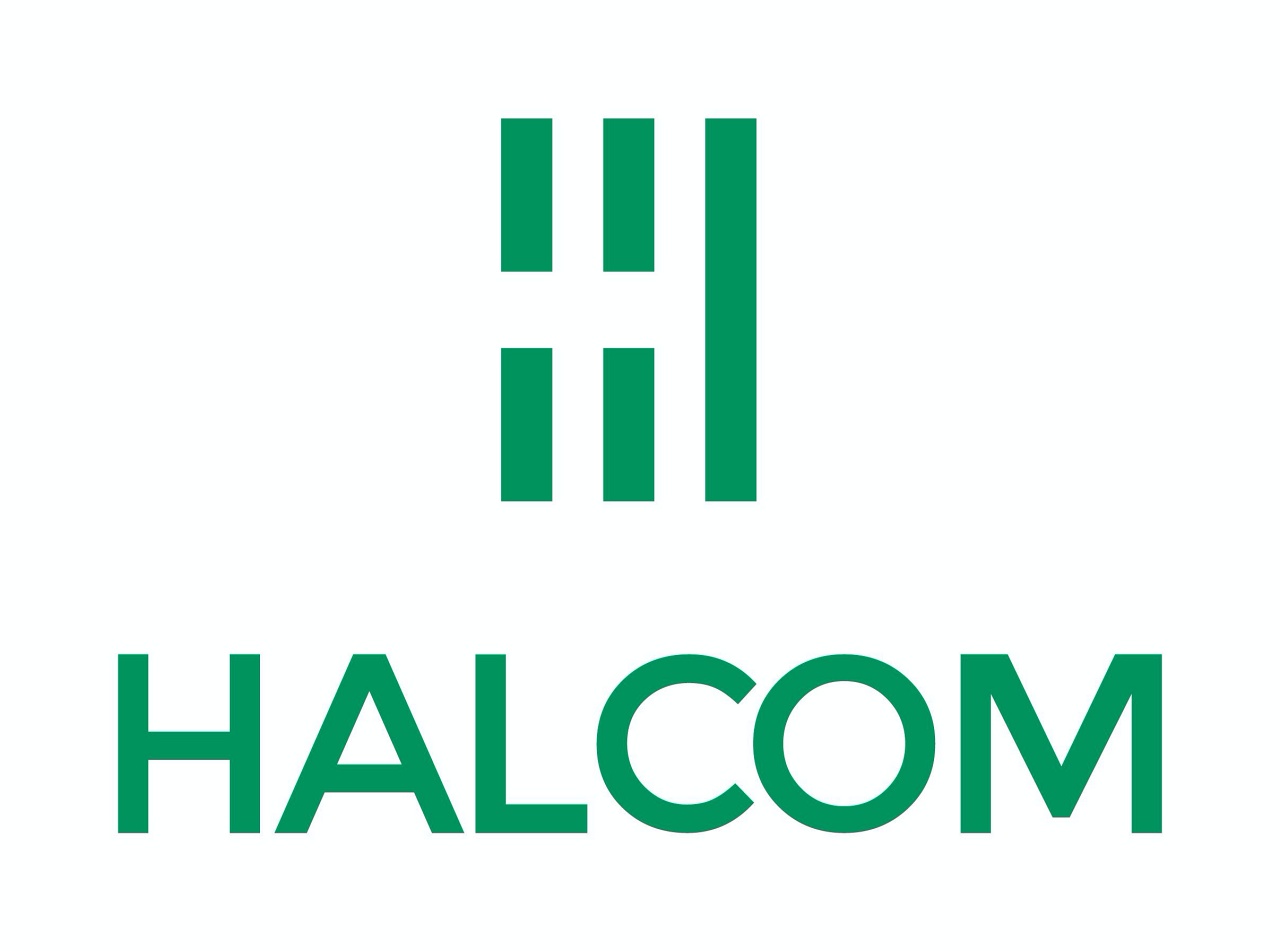Statistically, Vietnam is among the 20 countries with the highest amount of waste, and much higher than the world average. By 2025, the rate of domestic solid waste generation is forecasted to increase by 10-16% per year. In big cities like Hanoi and Ho Chi Minh City, it is focused to be 7,000-9,000 tons of waste released everyday. Under the circumstance of increasing domestic waste which might be the underlying cause of environmental and ecological crisis, finding effective waste treatment methods or technologies for Vietnam is currently a heated issue with various concerns causing the hesitation among policy makers.
With the topic “Waste treatment technologies – Which one would be the appropriate option”, the Seminar organized by the People’s Deputies Newspaper on August 8, 2022 to exchange and acknowledge opinions of National Assembly deputies, experts, managers, enterprises, voters around this issue; to facilitate conditions for provinces, cities and enterprises to access and decide on appropriate technologies to handle the current pressing problems; contributing to a green economy and sustainable development.
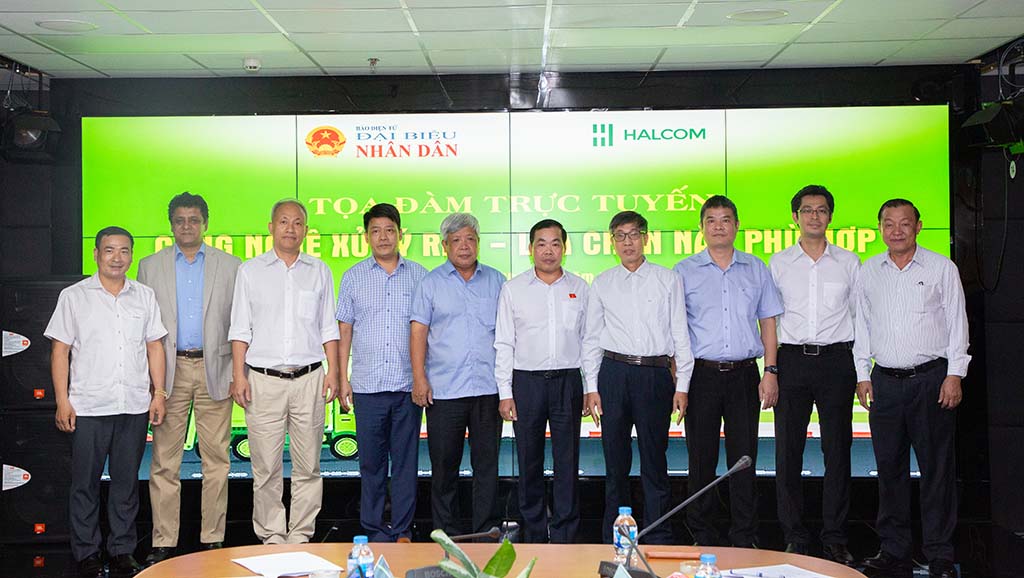
Attending the seminar were leaders of the Vietnam Association for Clean Water and Environment: Mr. Nguyen Linh Ngoc – Chairman of the Association, former Deputy Minister of Natural Resources and Environment; Mr. Nguyen Quang Huan – Member of the Committee for Science, Technology and Environment of the National Assembly, Vice Chairman of the Association, Chairman of the Board of Directors of Halcom Vietnam Joint Stock Company; Mr. Nguyen Van Toan – Vice Chairman of the Association, Editor-in-Chief of Environment and Life Magazine.
Invitees at the seminar include: Mr. Nguyen Thuong Hien – Deputy General Director of Vietnam Environment Administration, Ministry of Natural Resources and Environment; Mr. Nguyen Cao Tri – Project Development Manager, WELLE Vietnam; Prof. Academician Nguyen Quoc Sy – President of the Management Board of VinIT Institute of Technology; Mr. Vo Tien Dung – Deputy General Director of Halcom Vietnam Joint Stock Company; Mr. Indronil Sengupta – Chairman of Vietnam Chapter, ASEAN-India Business Council.
Confusions about the technology
The National Assembly has decided the rate for municipal solid waste collection and treatment meeting the standards and regulations to achieve 89-90%, the punishment rate of facilities causing serious environmental pollution to reach 100%. However, the drastic intervention of the Government, all levels and sectors is still in need. And without drastic implementation and selection of appropriate technologies, urban areas and cities cannot achieve the goals as set out in the National Assembly’s Resolution.
According to Mr. Nguyen Cao Tri, Project Development Director of WELLE Vietnam, in order to solve the current waste problem in Vietnam, it is necessary to harmonize environmental, social and financial factors. In addition, it is also necessary to consider the issue of affordability or the budget payability of the province in the project area.
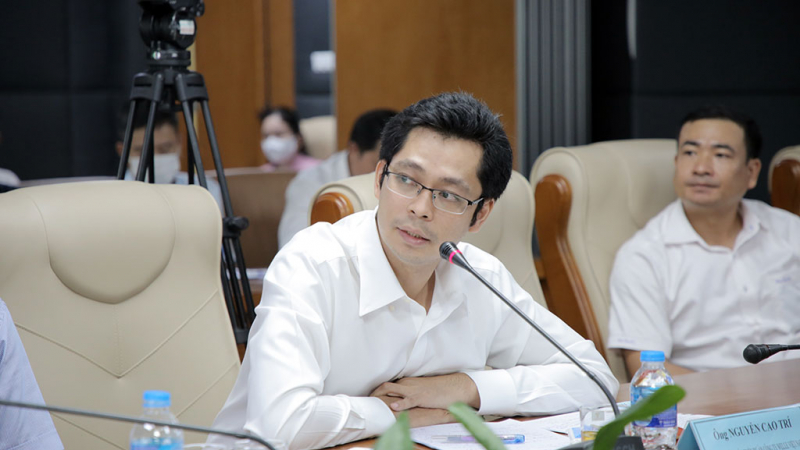
Mr. Vo Tien Dung, Deputy General Director of Halcom Vietnam Joint Stock Company, said that there are many projects brewing to develop waste treatment technology in Vietnam. However, only two plants in Hanoi and Can Tho have officially come into operation. In recent years, our company has begun to expand investment into waste treatment projects, which is partly a corporate responsibility for the overall development of the country, and partly to diversify the company’s portfolio. company. Halcom has established partnership with German, Finnish, and Japanese companies, expecting to find the optimal technologies, but none of which is currently applied directly in Vietnam.
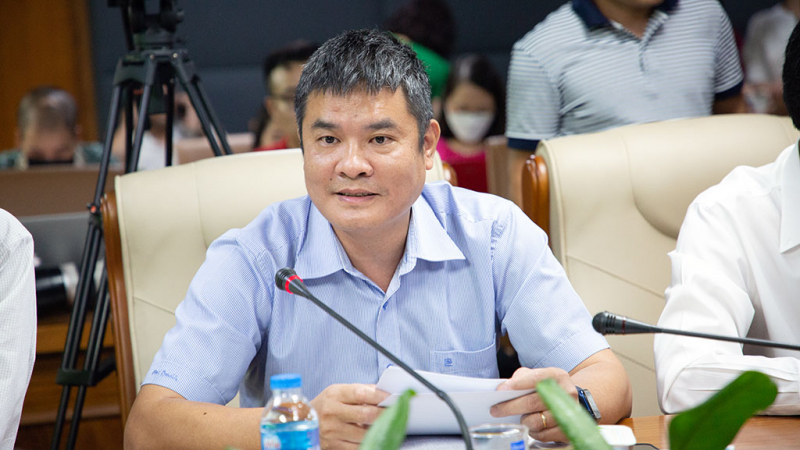
Mr. Nguyen Thuong Hien, Deputy General Director of Vietnam Environment Administration, Ministry of Natural Resources, said that, in addition to the technology factor, technical infrastructure, the arrangement of waste storage and collection locations waste must be appropriate for residential areas. Secondly, how to choose the right treatment technology is also an urgent issue. We should apply different treatment technologies to suit waste characteristics, waste composition and natural conditions of each locality.

Prof. Academician Nguyen Quoc Sy, President of VinIT Institute of Technology, said that waste treatment in Vietnam is facing daunting obstacles, not only in the sorting stage, but also in high humidity, low heating value…. And one of the most difficult problems today is the application of advanced technology to waste treatment. Considering the habits and behaviors of Vietnamese people, waste classification and collection is much more difficult than in other countries. This is not a thing that can be changed overnight. In the upcoming years, there must be a punishment for those who do not separate waste. But in the meantime when no policy is proposed for that, we must have preparation steps and come up with a roadmap.

Agreeing with Mr. Sy’s point of view, Mr. Nguyen Linh Ngoc, Chairman of the Vietnam Association for Clean Water and Environment, former Deputy Minister of Natural Resources and Environment, said that currently we are still very confused about treatment technology, policy and cost.
According to Mr. Ngoc, the Ministry of Natural Resources and Environment first needs to research policies and fully understand them. In the Law on Environmental Protection 2020, it is clearly stated that waste separation at source is essential and fundamental for waste treatment. For example, people in two communes – Duc Tu and Lien Ha, Dong Anh district, have practiced waste separation well at source.
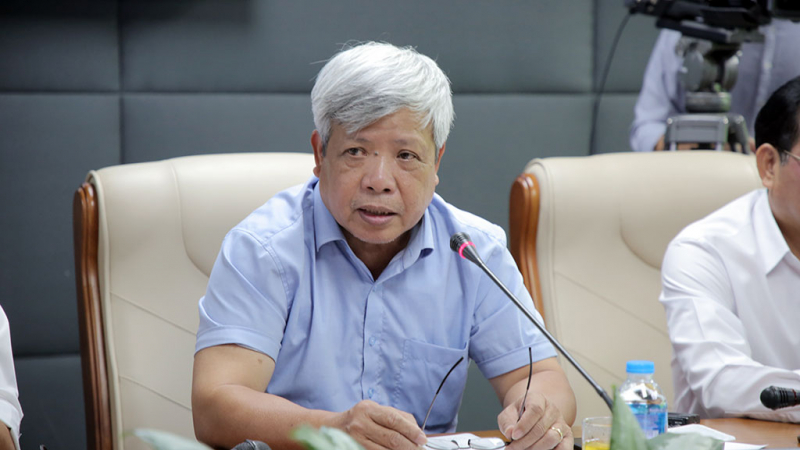
The current backlogged waste in centralized landfills must be resolved for sure. The Ministry of Natural Resources and Environment needs to have an appropriate policy in this regard. If any enterprise can process all the waste at the dumps while still ensuring environmental standards, they can have the right to exploit that land after treatment.
Finding a technology to clean up the amount of waste right now is extremely difficult, but the right technology or policy can solve the backlog problem in a short time. As for the long-term future, we are still required to separate waste at source.
According to Mr. Nguyen Quang Huan, member of the National Assembly’s Committee on Science, Technology and Environment, 70% of the waste in our country is currently being disposed by landfilling, but only 2% of which are properly buried. The landfill that meets the sanitation standards must be able to collect leachate…
Besides, there is another waste treatment technology that can produce biogas and organic mineral fertilizers; convert organic waste into compost, microbiological fertilizer; waste incineration technology without electricity generation… These technologies are also facing difficulties because waste separation has not been implemented and still causes pollution.
The most recent Circular 02/2022/TT-BTNMT details the implementation of a number of articles of the Law on Environmental Protection of the Ministry of Natural Resources and Environment, but to apply waste to energy requires waste classification. However, there is also a delay in the process of communicating and mobilizing people to classify right from the source.
In the upcoming August or September, the Science, Technology and Environment Committee will chair a National Solid Waste Explanation Session as assigned by the National Assembly Standing Committee.
“Currently, the Commission has conducted surveys in the localities, and it will work with ministries, departments and agencies in the near future to publish specific reports, to find out why we have not been able to treat waste radically. What technology to choose? At that time, the Ministry of Natural Resources and Environment and the Ministry of Science and Technology will provide more specific opinions,” said Mr. Nguyen Quang Huan.
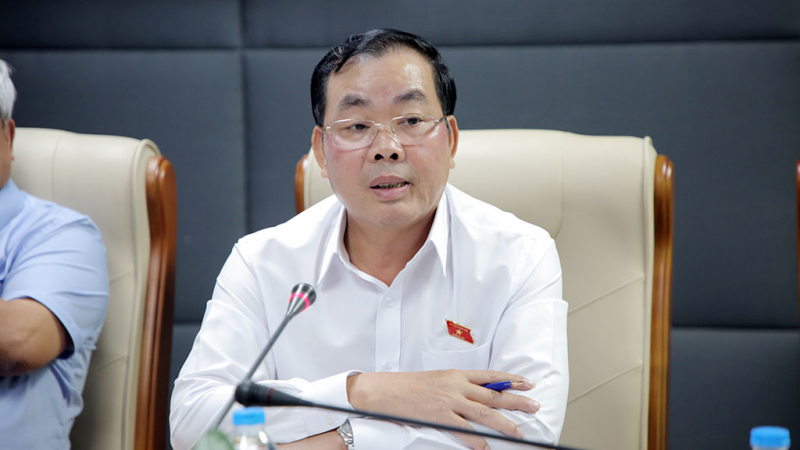
What are the criteriaof the appropriate technology?
According to Mr. Huan, Ministry of Science and Technology in conjunction with Ministry of Natural Resources and Environment should have specific guidelines for localities on various types of technological criteria. What technology is applied in the context that we have not classified waste at the source as at present, or there is a locality that has already classified it, but might be mixed up due to infrastructure conditions in transshipment and transportation. In order to handle it, the first thing that technology must meet is to classify waste in the spirit of Circular 02 of MONRE. The second criterion is to recycle the waste into marketable and environmentally friendly products, either selling electricity, or creating gas for electricity production, either RDF pellets or bio-fertilizers… The third criterion is that if an enterprise causes environmental pollution when incinerating waste, it must be absolutely banned. Finally, the amount of ash and slag brought to landfill needs to be limited in volume. There is nothing left to be treated if that percentage reaches up to 25-30%.
Answering the question “Is technology a bottleneck in waste treatment?”, Mr. Nguyen Thuong Hien said, the problem here is not technology, but to opt the suitable technology for the economic, natural and environmental conditions of each locality. In particular, whether the payment for technology and the ability to deploy the application is satisfactory and effective.
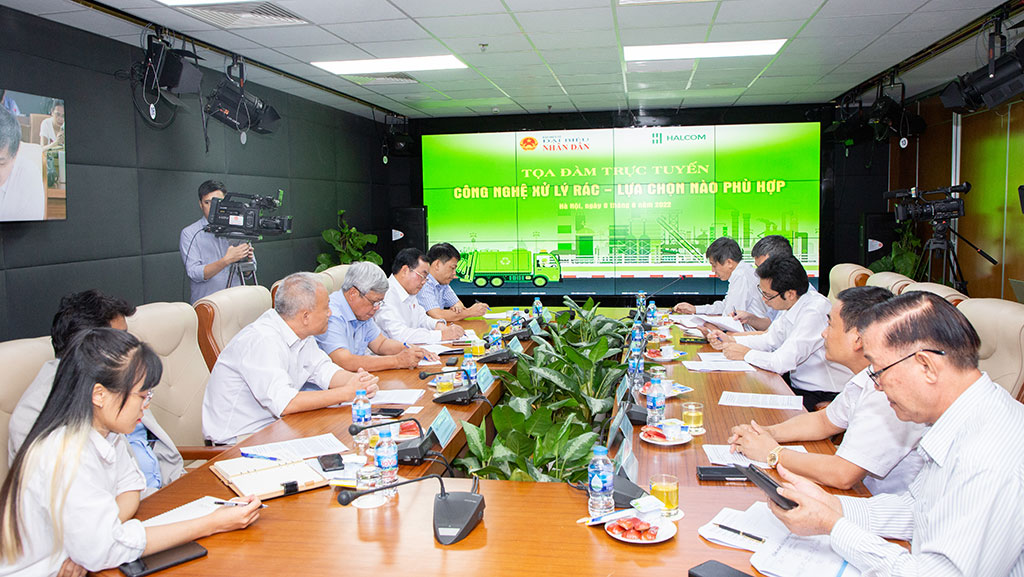
Basically, the current system of legal documents, regulations, standards, provisions, and criteria on waste classification, transportation and treatment is relatively complete. On the basis of the Law on Environmental Protection, the Ministry of Natural Resources and Environment has basically issued all legal documents such as: Submitting Decree No. 08/2022/ND-CP to the Government for promulgation, in which there are regulations on waste treatment; documents such as criteria on domestic waste treatment technology, collecting opinions from ministries and departments to issue a set of criteria for sorting waste at source. Based on current regulations and natural and economic conditions and this set of criteria, localities can make the choice of appropriate waste treatment technology. Provinces and cities will be the unit to decide which technology to choose for waste treatment in their locality…
Currently, there are regulations on waste and leachate treatment, and the regulations for sanitary landfills have been issued since 2009. Domestic solid waste incineration is being referred to Regulation 61, currently the Ministry of Natural Resources and Environment is making amendments and supplements to adapt to the current conditions.
For some technologies that Vietnam has never applied, we shall apply strictly regulations of the owner countries when bringing that technology into Vietnam. Therefore, we do not worry about the absence of appropriate regulations and standards for new technologies.
Next, for the criteria of waste treatment technologies, we need to strictly comply with the provisions of the Law on Environmental Protection and Circular 02 of the Ministry of Natural Resources and Environment. Currently, in order to apply waste treatment technology in Vietnam, it is necessary to ensure 3 things: environment (environmental standards and regulations), society (people’s satisfaction) and economy (reasonable price). Appropriate treatment technology needs to fully satisfy the above 3 criteria. If we use technology that only meets one or two contents, that technology is not optimal. For example, if the treatment technology ensures environmental and social factors, but the locality cannot afford the cost, that technology is also a “failure”. Or if the technology is cheap and environmental-friendly, but it is not suitable for the waste classification in that locality, we cannot choose it… Therefore, the applied technology must have an appropriate price and meet the requirements, standards, regulations, people’s satisfaction and properly meet the natural conditions of the locality where the technology is applied.
On the other hand, the applied waste treatment technologies also need to comply with the law on technology transfer. Accordingly, there are also clear regulations on the responsibilities of the concerned ministries, departments and localities… Particularly for domestic waste treatment technology, currently mainly under the jurisdiction of the People’s Committees of the provinces, cities, Departments of Science and Technology. Science and Technology of provinces and cities will evaluate the legal criteria on technology transfer.
As for the decentralization of management on environmental protection, we also have clear regulations, environmental impact assessment for the project of over 500 thousand tons/day belongs to the approval authority of Ministry of Natural Resources and Environment, for the project capacity of less than 500 thousand tons/day, the environmental impact assessment approval belongs to the authority of the People’s Committees of provinces and cities…
News sources and photo sources:
- People’s Deputies Newspaper: “Waste treatment technologies – Which one would be the appropriate option”
- VnExpress: Optimal waste treatment technology yet to be found in Vietnam
- Market Life Newspaper: Vietnam still “confused” in choosing waste treatment technology
- Environment & Life Newspaper: Necessary to choose the right waste treatment technology to protect the environment

